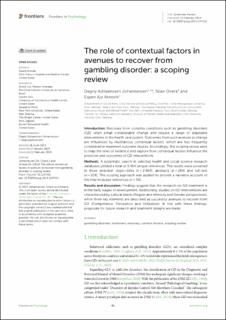The role of contextual factors in avenues to recover from gambling disorder: a scoping review
Peer reviewed, Journal article
Published version
Permanent lenke
https://hdl.handle.net/11250/3117129Utgivelsesdato
2024Metadata
Vis full innførselSamlinger
- Publikasjoner fra Cristin [3269]
- SAM - Institutt for sosialfag [471]
Originalversjon
https://doi.org/10.3389/fpsyg.2024.1247152Sammendrag
Introduction: Recovery from complex conditions such as gambling disorders (GD) often entail considerable change and require a range of adaptable interventions in the health care system. Outcomes from such avenues to change are influenced by multifarious contextual factors, which are less frequently considered in treatment outcome studies. Accordingly, this scoping review aims to map the level of evidence and explore how contextual factors influence the provision and outcomes of GD interventions. Methods: A systematic search in selected health and social science research databases yielded a total of 2.464 unique references. The results were screened in three selection steps—titles (n = 2.464), abstracts (n = 284) and full-text (n = 104). The scoping approach was applied to provide a narrative account of the final included references (n = 34). Results and discussion: Findings suggest that the research on GD treatment is in the early stages of development. Additionally, studies on GD interventions are characterized by cultural biases (Region and ethnicity and Gender perspectives), while three key elements are described as successful avenues to recover from GD (Competence, Perception and Utilization). In line with these findings, proposals for future research and treatment designs are made.

